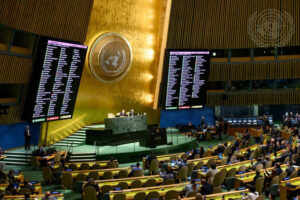
Active Citizens, Asia-Pacific, Civil Society, Combating Desertification and Drought, Conferences, Conservation, Development & Aid, Editors’ Choice, Featured, Headlines, Human Rights, Latin America & the Caribbean, Sustainable Development Goals, TerraViva United Nations, Water & Sanitation

Forum of Arab Parliamentarians on Population and Development met in Bahrain to to address water scarcity. Credit: APDA
– The Arab region is among the most water-scarce areas globally, as nearly 392 million people live in countries facing water scarcity or absolute water scarcity. So dire is the situation that, of the 22 Arab countries, 19 fall below the annual threshold for water scarcity in renewable resources, defined as 1,000 cubic meters per person.
Worst still, 13 countries fall below the absolute water scarcity threshold of 500 cubic meters per person per year. Water scarcity in the Arab region poses a serious challenge, threatening the achievement of Sustainable Development Goals and the realization of the fundamental human right to access water and sanitation.
It is within this context that the Forum of Arab Parliamentarians on Population and Development, in collaboration with the Asian Population and Development Association in Japan and with support from the United Nations Population Fund, held a meeting on October 26, 2024, in the Kingdom of Bahrain to address water scarcity as a development concern and promote coordinated action across different sectors.
Dr. Mohamed Al-Samadi, Secretary-General of the Forum of Arab Parliamentarians on Population and Development, stressed the need for coordinated governance and measures to close the gap between water security and the Sustainable Development Goals. The gathering that included Bahraini parliamentarians from committees focused on population and development, along with representatives from civil society organizations, experts, academics, and government officials.
The gathering reiterated that “researchers in the field of water science have set the water poverty line at 500 cubic meters per person annually, while 1,000 cubic meters of freshwater per person is considered the threshold for achieving water security. Reports also link this to food security, showing that producing an individual’s annual food supply requires over 2,000 cubic meters of water.

Lawmakers and experts stressed the need for coordinated governance and measures to close the gap between water security and the Sustainable Development Goals. Credit: APDA
Stressing that the “water security in the Arab world is now critically at stake as annual usable water resources fall below 40 billion cubic meters. A large portion of these resources is lost to evaporation and infiltration into the soil, and additional amounts are necessary to sustain river flows to their endpoints. Any country that uses 40 percent or more of its total annual water resources is considered to be facing severe water scarcity according to the Water Scarcity Index, also known as the Water Sustainability Index.”
Dr. Muneer Ibrahim, a Member of Parliament and member of the Committee on Water, Environment, and Public Utilities, spoke about water security and the SDGs, emphasizing that water is the fundamental pillar for achieving these global goals across their economic, social, and environmental dimensions, as water security is an essential requirement for their realization.
Further stressing that the relationship between water and sustainable development is reciprocal, and this interconnectedness poses significant challenges in the Arab region, especially given the current water situation. Necessitating the development and implementation of effective policies and solutions to ensure sustainable water resources for various uses.
Hassan Ibrahim, a Member of Parliament and the rapporteur for the Water Committee, spoke about innovation for sustainable water management, highlighting that resolving the water crisis is essential for a livable future on our planet. Noting that whether water is overly abundant, severely scarce, or highly polluted, it presents a triple threat exacerbated by climate change, depriving billions of people of access to clean, safe water and sanitation services.
He said that this then “threatens economies, encourages migration, and may fuel conflict. We need global action to establish water security to enable inclusive and resilient green growth while addressing the interconnected relationship between water, climate, and conflict. Despite the progress made, we are falling behind in achieving the SDGs related to water, which directly affect inclusive development.”
Current trends indicate that by 2030, 1.6 billion people will lack access to safe drinking water, 2.8 billion will be deprived of safe sanitation services, and 1.9 billion will be without basic hygiene facilities. Globally, the investment needs for the water sector exceed USD 1.37 trillion and must increase sixfold from current levels to meet the sixth SDG on ensuring availability and sustainable management of water and sanitation for all by 2030.
“Water accounts for less than 2 percent of public spending, and private investment levels in this sector are also low in low- and middle-income countries. Bahrain has adopted strategies and initiatives to improve the management of water resources, support the strategic water stock, and increase the area and sustainability of rainwater harvesting efficiency to enhance natural groundwater resources,” Ibrahim said.
Bahrain is implementing advanced technical solutions to utilize treated wastewater for irrigation needs, which also helps reduce environmental pollution, address the impacts of climate change, and minimize the depletion of natural water resources. Bahrain, through the Water Security Strategy 2030 launched by the Ministry of Energy and Environment, aims to ensure the sustainability and continuity of access to water under both normal conditions and extreme emergencies.
The key targets of the strategy include reducing total water resource demand by 21 percent, increasing the water productivity index to USD 110 per cubic meter, lowering the water scarcity index by three degrees, and raising the percentage of treated water reuse to 95 percent. Dr. Walid Zubari, a water resources expert and president of the Arab Water Association, presented on the vital role of civil society institutions in raising water awareness to achieve water sustainability and address the challenges facing the water sector in Bahrain.
Regarding civil society institutions, Dr. Zubari said, “It is important for them to play a role in water awareness. Once community members understand the implications of their behavior in dealing with water and there is a religious and moral incentive, it is likely that they will voluntarily rationalize their water usage. If this happens, the community and the executors will be in the same boat, enabling them to achieve water sustainability.”
Dr. Karim Rashid, Member of Parliament, delivered a comprehensive presentation on the importance of water and its essential role in supporting sustainable development, as water impacts all aspects of development and is closely linked to nearly every SDG, driving economic growth, supporting healthy ecosystems, and being essential for life itself.
Still, nearly two billion people worldwide lack access to safely managed drinking water services, while around 3.6 billion suffer from inadequate sanitation services. To enable effective climate change adaptation, he said activities should reflect the importance of water management in reducing vulnerability to risks and building resilience against climate change.
Further emphasizing the necessity of political commitment and leadership, technological innovations, and the advancement of service delivery models and financing to support governments in fulfilling their commitment to achieve Target 6.2 of the SDGs—”to ensure access for all to adequate and equitable sanitation and hygiene services by 2030.”
The expert and water sector advisor at the Ministry of Water in the Kingdom of Bahrain, Eng. Mohammed Sawar, called for adopting a model transformation in the management of water resources in the GCC countries, shifting from the current focus on “supply sustainability” to “consumption sustainability.” Emphasizing economic efficiency in water usage and financial sustainability of water services.
Note: This meeting was supported by the Asian Population and Development Association (APDA), the United Nations Population Fund (UNFPA) and the Japan Trust Fund (JTF).
IPS UN Bureau Report











